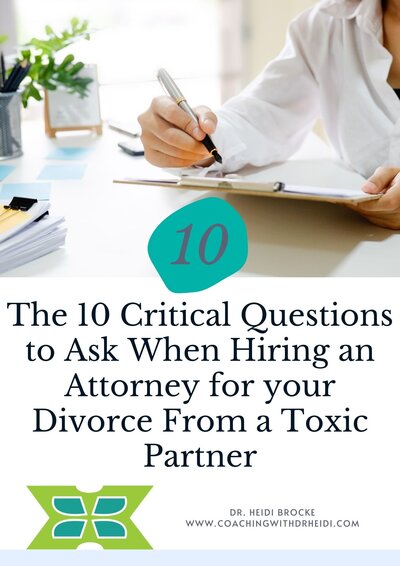Hey, good afternoon!
I was running around today, cleaning my house and setting up my new bed (which I LOVE!), and I was trying to think of what I wanted to talk about today.
As you all know, I started talking about the characteristics of the toxic person over the last couple of weeks. I had several people contact me over the long weekend because of toxic situations. It just made me feel like there was something different I should be talking about today. I heard my phone ding and just happened to get a message from a podcast listener. She had some really good thoughts that made me think I should go back a little bit and lay a little more groundwork.
One of her questions was, “How do you know if another person is toxic or if you’re just reading into it because you’re such a sensitive person?”
If you are trying to decide if you are in a relationship that’s toxic, a toxic job situation, or a toxic friendship, the first thing that you have to be is objective. Because you are a sensitive person, you don’t want to feel like there’s something wrong with somebody else. If you are sensitive and you’re caring, you don’t want to take it upon yourself to judge others or hurt others’ feelings. Even considering that they might be toxic or doing research to find out what the problem is may make you feel bad.
Let’s look at it like this: If it’s somebody you’ve fallen in love with or somebody you have invested time in or somebody you are really integrated with, it hurts to suggest or to think that there’s something wrong with them. So let’s not ask “Are they toxic?” but rather “Are they healthy for me in my life?” If you put it that way, it takes the problem and the blame and the accusation off of them, and really just makes it about you. It makes it much simpler, and you don’t have to feel as much guilt.
If you’ve been with them for a while and have invested your life in them, the last thing you want to read about in your research is all of the things wrong with them. You just need to objectively decide to do your research to decide whether or not they are healthy for you or not. You aren’t out to discover “what’s wrong with them.”
The second thing you need to know is that if you are a sensitive person, you are a target for toxic people. Why? Sensitive, empathetic, loving, compassionate people will be able to give a toxic person what they need. What does a toxic person need? Attention. Admiration. Control. Power. Loyalty.
A toxic person, in general, needs these things to survive. They are the basis for their existence. They would not get those things from a person who was not sensitive or who was not loving or compassionate or wanting to please people.
So that being said, as a sensitive person you are a target. Toxic people pick you. You do not pick them.
Most of my clients will say that they saw red flags in the beginning or they felt something was not right very early on. But because of their sensitive side, they assumed the best and allowed the excuses or took the blame upon themselves. When they get through my programs and are fully educated on the traits of the toxic person and why they do them, looking back they can see it plain as day, and 99% of them say, “I knew it! I knew that was not right, but I convinced myself that it was me.”
That does not mean that you quit being a good, loving, caring, sensitive person. It just means that you need to learn when you are being a good person to the wrong person. Toxic people will take advantage of your good qualities with no remorse and no fear of consequences, and they will make you feel that it is your fault when it happens.
Those who have been listening know I’ve been going over the tactics and the characteristics of the toxic person. The reason I do this is to educate you on the multitude of ways toxic people get their steady supply of attention, admiration, control, and power. The toxic traits are not anything that I made up. They are just plain awareness.
Everything that a toxic person does is to get attention, admiration, control, or power. They will bulldoze those that are closest to them to get it because those that are closest to them are sensitive, empathetic, loving, giving, compassionate, caring people. Just know that it is the people closest to the toxic people that hurt the worst because of it.
Not all toxic people have all of the traits, but because you know you are a sensitive person, you owe yourself the knowledge of as many traits as possible. Why? These are not the only toxic people in the world. Your path will cross many other paths of other toxic people. Because you know yourself to be sensitive, you need to protect yourself. You will become a target of another toxic person.
Toxic people are everywhere. They are in romantic relationships, social situations, within families, within work environments, within your best friend circles. By educating yourself you are able to protect yourself. You don’t have to take them all out of your life, but you need to know how to respond without being taken advantage of or being blamed for certain things.
As you listen to the traits of the toxic person, you must realize that you have been trained to believe that it is you. You have been trained to believe that you are too sensitive and you are to blame. The reason you’ve been trained that way is so you stay on that never-ending treadmill of trying to fix, help, support, improve, apologize, and change whatever it takes to resolve the situation at hand. But guess what? It will never be good enough. It will never be right, and you will always come up short.
The reason they do this is 100% so they are reassured that they can control you. If they blame you, make it your fault, say you’re too sensitive, deflect on you, they know that they’re controlling you. If they make you feel just a little bit bad, you’ll do everything you can to fix it. They keep you so busy second-guessing yourself that you don’t have time to question them or their behavior.
A toxic person will be the first to tell you that you are toxic. Why? It takes the attention off of them and you start fixing stuff. If you are in a relationship that is unhealthy, chances are you have taken the blame for an abundance of things that were not yours to take. They know that blaming you not only keeps you busy trying to fix stuff, but also makes them feel better about themselves. Toxic people generally feel better when others are struggling. It gives them a sense of power and control. If you look like you are falling apart, they look like they have got it together. It’s a never-ending cycle of you trying to prove yourself.
Now, the next question was, “What if I find that the more I listen, the more I think I might be toxic?”
You must know that toxic traits are contagious. They rub off. If you’ve been spending years in a toxic work environment or with a toxic friend or in a toxic marriage, you eventually have to fight fire with fire. You will start yelling even if you’re not a yeller. You will start name-calling even if you aren’t a name caller. You will start mirroring the same characteristics because, at some point, you finally give up and start giving it back to them.
As you research, remember to evaluate yourself as well. The toxic person will accuse you of things that they are doing to keep the attention off of them. I don’t know how many of my clients have come in and told me, “Well, he’s accusing me of having an affair. I’ve been a loyal wife since the day I got married.” Okay, chances are you might want to check into that. That’s a big one. Financial situations arise and you get accused of taking money. Okay, you might want to look into that. A toxic person will accuse you of things they are doing to keep the attention off of them.
They will make you feel like a bad person so they don’t have to feel badly about the way they are treating you. That’s why you take the blame or why they blame you.
A toxic person’s accusations, especially the extremely toxic ones, are often their confessions. If you get accused of something that is not in your character or is way off the mark, think about that. Toxic people’s accusations are often their confessions.
If you are trying to learn about this or trying to decide if you are in a toxic relationship (or if this is the first time you’re hearing about toxic relationships) and you feel like you might be the toxic one, I encourage you to take a poll of the people that know you the best and the people that are your support system. If they don’t view you as toxic and they are not saying the same thing as the possible toxic person in your life, I think the majority vote wins. If you’re questioning your reality and thinking you might be toxic, double-check that you aren’t falling into the mirroring and fighting fire with fire, and ask the people who are closest to you and know you the best if they see toxic traits in you.
If you are in a situation where you have just realized that or you’ve heard someone talking about this and you think, “Oh my goodness, this sounds like me. This sounds like my life,” I have a quick way that I, myself, can give you a quick analysis of your situation. I have been implementing it for over two years and it has been working well. The Toxicity Profile Analysis (or TPA) is on my website. It is a 106-question Yes/No survey, and each question correlates to a toxic trait. You submit the TPA and after I do a quick evaluation, we can set up a consultation. What it does it gives me an overview of which toxic traits you are dealing with or have dealt with in your past, and it also gives me a very good overall picture of the severity of the type of relationship you are in.
So, if you are questioning, “I don’t know, I don’t know if this is toxic. Maybe it is, maybe it isn’t,” the Toxicity Profile Analysis is an excellent way to objectively go through some questions and get an overview of the traits you’re being affected by and the level of toxicity you’re living in.
I hope this helped! I’m going to anticipate hearing from many of you about this. Again, you can reach me at my Coaching with Dr. Heidi Facebook or Instagram accounts, as well as through my website. You can also sign up for my e-mail list through the website or sign up to take the TPA!
Thanks for joining me today, and I hope that I am shedding some light on some of your situations. I am very accessible for questions and I hope to hear from you soon.
I’ll talk to you next week!









+ view comments . . .